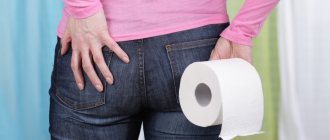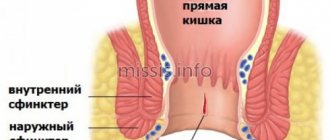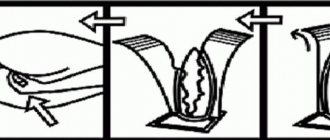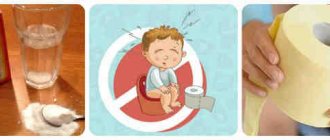Constipation is a disorder of intestinal function, consisting in difficulty, slowness, and often complete absence of excretion of feces. The problem occurs mainly against the background of diseases, but it happens that the cause of constipation is difficult to establish.
Constipation is a companion to hemorrhoids; it is both the cause of the disease and its manifestation at the same time. If the violation of bowel movement is chronic, then there is an increase in venous pressure in the rectal choroid plexus. This leads to negative changes in the hemorrhoidal veins of the rectum and anal area - hemorrhoids develop. What to do if constipation occurs with hemorrhoids , you will learn from this article.
Causes of constipation with hemorrhoids
Why does constipation develop with hemorrhoids ? There are several reasons.
- If hemorrhoids become inflamed, then when feces are released, they burst, even when the feces have formed normally. This causes pain, burning and a small amount of blood. To avoid such symptoms, a person can resist the urge to defecate. As a result, stool accumulates and hardens, leading to the formation of a fecal impaction.
- Constipation and hemorrhoids have common causes:
- passive lifestyle, sitting for a long time;
- childbirth and pregnancy;
- frequently occurring stressful situations;
- poor nutrition;
- hard physical work and overwork;
- period of menstruation in women;
- frequent use of enemas, etc.
Constipation due to hemorrhoids provokes inflammation of the hemorrhoidal intestine. If the intestines are not emptied for a long time, a pathogenic environment develops, which causes the appearance of new swellings. That is why it is very important to eliminate constipation in a timely manner. And to do this, you need to consult a doctor who will prescribe the correct treatment if you experience constipation due to hemorrhoids .
Sulfates
Among the well-known osmotic drugs are magnesium sulfate – “bitter salt” and sodium sulfate – “Glauber’s salt”.
Most often they are used to quickly cleanse the intestines before operations or examinations. Magnesium sulfate for chronic constipation can also be used as an enema - dilute 20 grams of the substance in 100 ml of water at room temperature.
Uncontrolled use of osmotic laxatives can cause nausea, vomiting, electrolyte deficiency and, as a consequence, fatigue, asthenia, arrhythmia, and convulsions. Against the background of a large intake of magnesium ions, loss of tendon reflexes, slowing of the rhythm, headache, decreased blood pressure, and weakness may develop.
All about hemorrhoids
Constipation with external and internal hemorrhoids
The accumulation of feces in the intestines leads to pressure on the intestinal walls, which provokes poor circulation in this area. As a result, blood accumulates in the curved vessels of the intestine, and this leads to the development of hemorrhoidal cones. They can appear inside the rectum (internal hemorrhoids) and also around the anus (external). You need to know that internal hemorrhoids cause constipation as often as external ones.
Constipation after surgery
What to do if constipation develops after hemorrhoid surgery ? First, let's look at the reasons.
- Basically, constipation after removal of hemorrhoids develops on a psychological basis. The patient is simply afraid to go to the toilet so that the stitches do not come apart and feel pain.
- Failure to comply with recommendations in the postoperative period. The main thing is to drink enough liquid and eat right. And on the first day after the operation, you should refrain from eating, because the process of defecation during this period will cause irritation of the wound, and this will provoke bleeding.
- Narrowing of the anus as a result of improperly applied sutures.
- Constipation is a side effect due to the use of medications.
- Low mobility on the first day after surgery.
Constipation after hemorrhoid surgery must be treated. Prescriptions are made exclusively by a specialist, using the following means:
- laxatives;
- rectal suppositories;
- microenemas (oil or herbal decoctions);
- therapeutic diet;
- special gymnastics;
- use of sufficient fluid;
- daily long walks.
Constipation due to hemorrhoids in pregnant women
What to do if constipation and hemorrhoids develop during pregnancy or after childbirth ? Do not take any medications or perform any procedures without a doctor’s prescription! Visit a doctor urgently! Only a specialist can prescribe treatment that does not have a negative effect on the course of pregnancy or on mother's milk.
Osmotic laxatives
There are salts - magnesium salts, sodium phosphate and polysaccharide derivatives - lactulose, sorbitol, mannitol. This group also includes glycerin-based laxative suppositories for hemorrhoids.
Their main effect is to “draw” water into the rectum from surrounding tissues. They cause normal physiological contraction of the intestinal muscles. Saline laxatives taken on an empty stomach can begin to act after 2 hours. The most common side effect is loss of electrolytes and dehydration.
How to treat?
How to get rid of constipation with hemorrhoids ? This question worries almost all patients. Medicines will help solve the problem, but they should be prescribed by a proctologist after an examination. However, how to go to the toilet if constipation has developed due to hemorrhoids , and there is no way to get to the doctor right away?
- Oil microenema. You can take sunflower, olive, flaxseed, castor oil and heat it in a water bath to 37 - 38 degrees, then give an enema. It is better to perform the procedure before going to bed, since the oil enema does not work immediately. Heated oil envelops hardened stool and promotes its movement without damaging the mucous membrane. An oil enema for constipation and hemorrhoids is the “mildest” procedure; it does not expose the body to stress.
- If the situation requires immediate action, an enema with 10% saline solution will help. It creates some discomfort, but acts quickly.
- Rectal suppositories for constipation and hemorrhoids , which contain glycerin. They act gently and have a harmless composition.
- At the same time, you can help yourself by using some food products. A mixture of prunes, figs and dried apricots, minced in an equal amount in a meat grinder, helps a lot. Mix all ingredients and take 1 tsp. every day 30 minutes before meals. You also need to follow a drinking regime, drinking up to 1.5 - 2 liters of still water.
- Laxatives for constipation and hemorrhoids are prescribed only by a doctor!
Lactulose
Many experts agree that the best and safest remedy is lactulose-based drugs (Duphalac, Normaze, Goodluck, Portalac). The laxative effect of these drugs develops after lactulose is broken down into organic acids by the intestinal flora. They make the pH in the intestines acidic, the osmotic pressure increases and the volume of intestinal contents increases, the consistency of the stool softens. Normal stool frequency is restored.
There are many drugs containing lactulose.
In addition, lactulose is a nutrient substrate for the growth of normal microflora in the intestine. Beneficial bifidobacteria and lactobacilli help cope with intestinal infections, and also produce some enzymes that help digest food.
The effect of the drug develops within two to three days. Lactulose can be taken long-term without fear of side effects. After all, it does not irritate the intestines, does not provoke spasms, and naturally enters into the physiological process of formation and excretion of feces.
Unfortunately, lactulose cannot be taken if you have diabetes mellitus, fructose intolerance, galactose intolerance, intestinal obstruction, inflammatory diseases of the digestive tract and impaired water-salt metabolism.
Diet for constipation and hemorrhoids
A very important condition during treatment is to review your diet. A diet for hemorrhoids and constipation will help you quickly get rid of the problem, avoid rupture of the hemorrhoids and aggravation of the inflammatory process.
| Authorized Products | Prohibited |
|
|
Meals for hemorrhoids and constipation should be small and frequent (6 - 7 times) in small portions, and you should also consume a sufficient amount of water (from one and a half liters per day).
Now let's take a look at the sample menu for constipation and hemorrhoids .
Breakfast:
- omelette, boiled broccoli;
- steamed fish, 1 tomato;
- wheat porridge cooked with milk, dried apricots;
- soft-boiled egg, mild cheese;
- low-fat cottage cheese with grated apple or prunes.
II breakfast:
- cottage cheese casserole, sour cream;
- fermented baked milk with a small amount of bran;
- fresh berries;
- carrot salad;
- apple-curd casserole.
Dinner:
- millet soup, steamed fish with vegetables;
- lean borscht, stewed veal, vegetable salad;
- chicken broth with cereal, mashed potatoes with boiled chicken.
Afternoon snack:
- fruit jelly;
- bran yogurt;
- grated carrots with sour cream and honey;
- fruit salad with yogurt.
Dinner:
- omelet, fresh cucumber salad;
- steamed fish, stewed vegetables;
- steamed meat cutlet, cucumber salad.
conclusions
Since hemorrhoids often have a chronic course and require constant adjustment of stool, the laxative should have maximum safety. It is most rational to switch to stool-forming laxatives-fillers and refrain from chronic use of stimulants. You can take lactulose-based medications for a long time; they have a positive effect on the digestion process and the movement of feces. Among suppositories, preference should be given to glycerin ones as the safest.
Preventing constipation with hemorrhoids
Everyone knows that preventing a disease is easier than treating it. Let's do prevention.
- Review of diet. It is necessary to eat foods rich in dietary fiber: fresh vegetables, fruits, bran, nuts, dairy products. Limit meat, fat, alcohol, viscous cereals. If there are no contraindications, you should drink 1.5–2 liters of water or compote without sugar.
- Diet. It is recommended to eat 3-4 times a day, with a break of no more than 4-5 hours between meals. It is not advisable to eat food 2 hours before bedtime.
- Defecation mode. Bowel movements should be done daily. It is forbidden to suppress the urge to defecate, as well as uncontrolled use of constipation pills.
- Physical activity. This prevents fecal stagnation, as it enhances peristalsis and improves blood supply to the intestines.
- Stress control. In life, it is not always possible to avoid stressful situations, but trying to control your emotions during nervous tension is simply necessary.
Constipation due to hemorrhoids is a dangerous condition that can cause serious consequences. Do not self-medicate, but contact a proctologist!
Anthraquinones
These biologically active substances are contained in senna leaf, buckthorn bark, and castor oil. Anthroquinone glycosides are converted by intestinal bacteria to their active form. These molecules help retain water in the stool and stimulate increased peristalsis. The onset of action is 6 hours, during which time the laxative is transported to the colon. These active substances can strongly irritate receptors in all parts of the intestine - large and small, so the laxative effect is often difficult to control and determine a sufficient dose to keep the stool soft, but without causing cramps.
Senna may be present in preparations, teas, tablets - carefully study the composition
The use of herbal stimulants should only be considered if changes in diet and lifestyle have not produced a positive effect, and bulk laxatives have been ineffective.
Senna derivatives are contraindicated for obstruction, acute intestinal inflammation, and abdominal pain of unknown origin.
They should not be given to children under 12 years of age, pregnant or lactating women.
The most common side effects include diarrhea, vomiting, abdominal cramps, dehydration, potassium deficiency and muscle weakness, and heart rhythm disturbances.
Even after stopping the use of laxatives, changes in the colon may only partially return to normal due to permanent damage to the nerves of the colon. Addiction is defined as using laxatives 3 times a week for 1 year.









